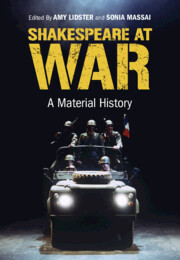Book contents
- Shakespeare at War
- Shakespeare at War
- Copyright page
- Contents
- Figures
- Notes on Contributors
- Acknowledgements
- Note on the Text
- Introduction
- Chapter 1 ‘The Truth for Which We Are Fighting’
- Chapter 2 The Seven Years’ War (1756–1763) and Garrick’s Shakespearean Nationalism
- Chapter 3 Revolutionary Shakespeare
- Chapter 4 Hamlet Mobilized
- Chapter 5 Shakespeare, the North-West Passage, and the Russian War
- Chapter 6 ‘Now for Our Irish Wars’
- Chapter 7 Shakespeare and the Survival of Middle England
- Chapter 8 Ellen Terry Stars at the Shakespeare Hut
- Chapter 9 The 1916 Shakespeare Tercentenary at № 1 Camp in Calais
- Chapter 10 Shakespeare Does His Bit for the War Effort
- Chapter 11 Germanizing Shakespeare during the First World War
- Chapter 12 Readers and Rebels
- Chapter 13 Forgotten Histories
- Chapter 14 ‘Now Good or Bad, ’tis but the Chance of War’
- Chapter 15 ‘Precurse of Feared Events’
- Chapter 16 But What Are We Fighting For?
- Chapter 17 Henry V and the Battle of Powerscourt
- Chapter 18 Unser Shakespeare in Nazi Germany
- Chapter 19 Framing the Jew
- Chapter 20 G. Wilson Knight’s ‘Royal Propaganda’ in ‘This Sceptred Isle’ (1941)
- Chapter 21 Shakespeare’s Desert Camouflage
- Chapter 22 ‘May I with Right and Conscience Make This Claim?’
- Chapter 23 Henry V and the Invasion of Iraq
- Chapter 24 Who Pays the Price?
- Chapter 25 ‘Mere Prattle, without Practice, Is All His Soldiership’
- Chapter 26 ‘Thou Hast Set Me on the Rack’
- Afterword
- Notes
- Index
Chapter 17 - Henry V and the Battle of Powerscourt
Published online by Cambridge University Press: 17 August 2023
- Shakespeare at War
- Shakespeare at War
- Copyright page
- Contents
- Figures
- Notes on Contributors
- Acknowledgements
- Note on the Text
- Introduction
- Chapter 1 ‘The Truth for Which We Are Fighting’
- Chapter 2 The Seven Years’ War (1756–1763) and Garrick’s Shakespearean Nationalism
- Chapter 3 Revolutionary Shakespeare
- Chapter 4 Hamlet Mobilized
- Chapter 5 Shakespeare, the North-West Passage, and the Russian War
- Chapter 6 ‘Now for Our Irish Wars’
- Chapter 7 Shakespeare and the Survival of Middle England
- Chapter 8 Ellen Terry Stars at the Shakespeare Hut
- Chapter 9 The 1916 Shakespeare Tercentenary at № 1 Camp in Calais
- Chapter 10 Shakespeare Does His Bit for the War Effort
- Chapter 11 Germanizing Shakespeare during the First World War
- Chapter 12 Readers and Rebels
- Chapter 13 Forgotten Histories
- Chapter 14 ‘Now Good or Bad, ’tis but the Chance of War’
- Chapter 15 ‘Precurse of Feared Events’
- Chapter 16 But What Are We Fighting For?
- Chapter 17 Henry V and the Battle of Powerscourt
- Chapter 18 Unser Shakespeare in Nazi Germany
- Chapter 19 Framing the Jew
- Chapter 20 G. Wilson Knight’s ‘Royal Propaganda’ in ‘This Sceptred Isle’ (1941)
- Chapter 21 Shakespeare’s Desert Camouflage
- Chapter 22 ‘May I with Right and Conscience Make This Claim?’
- Chapter 23 Henry V and the Invasion of Iraq
- Chapter 24 Who Pays the Price?
- Chapter 25 ‘Mere Prattle, without Practice, Is All His Soldiership’
- Chapter 26 ‘Thou Hast Set Me on the Rack’
- Afterword
- Notes
- Index
Summary
This essay explores how Laurence Olivier’s filming of the battle scenes of Henry V in neutral Eire during the Second World War was part of a broader plan by the British Ministry of Information (MoI) to influence the Irish people. Jack Beddington, of the MoI’s Film Division, worked with John Betjeman, then press attaché at the UK Representation in Eire, to facilitate Olivier’s journey to the Powerscourt estate in County Wicklow, which became a Shakespearean filmset. The essay shows that, in addition to the benefit of filming a medieval battle in a land devoid of modern warfare, the filming process itself was an ingenious way of getting around the Irish Censorship. The presence of so many filmmakers and the utilization of hundreds of Irish horses and horse riders, could not go unnoticed. Reporting of Olivier’s presence and speculation about aspects of the filming abounded, with multiple references in the Irish press – from the Irish Times to local papers – including reporting of the visit to the filmset by the key decision-maker on the island, Taoiseach Éamon de Valera. The essay demonstrates that, unlike other forms of propaganda, the making of Henry V played a key role in improving Anglo–Irish relations.
Keywords
- Type
- Chapter
- Information
- Shakespeare at WarA Material History, pp. 165 - 174Publisher: Cambridge University PressPrint publication year: 2023

